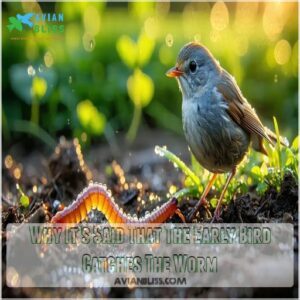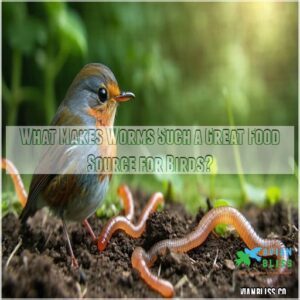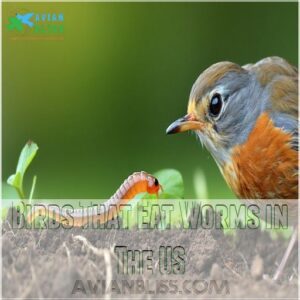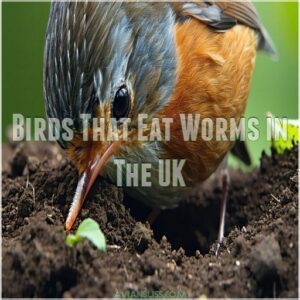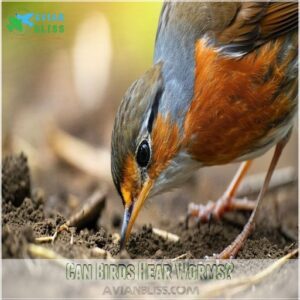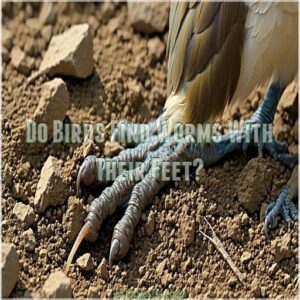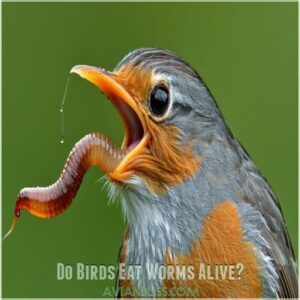This site is supported by our readers. We may earn a commission, at no cost to you, if you purchase through links.
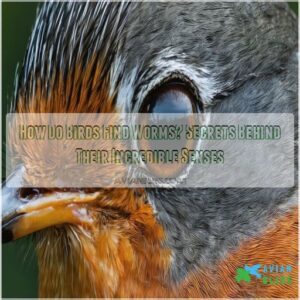
Their keen eyesight spots the tiniest soil movements from lurking worms, while their sensitive hearing picks up subtle underground rustling. They’ll even use their feet as seismic sensors, feeling vibrations through the ground as worms move below.
This sophisticated combination of senses makes birds, especially American robins, incredibly efficient worm hunters.
These protein-packed meals are worth the effort, providing essential nutrients for everything from muscle growth to feather maintenance.
There’s more to attracting these skilled hunters to your yard than you might think.
Table Of Contents
- Key Takeaways
- The Biology of The American Robin
- How Robins Locate Worms
- Why It’s Said That The Early Bird Catches The Worm
- What Makes Worms Such a Great Food Source for Birds?
- Which Birds Primarily Feed on Worms?
- Tips for Helping Robins Find Worms
- Can Birds Hear Worms?
- Do Birds Find Worms With Their Feet?
- Can Birds Smell Worms?
- Do Birds Eat Worms Alive?
- Frequently Asked Questions (FAQs)
- How did birds find worms?
- How do birds detect worms?
- Can birds hear worms?
- How do birds know if there are worms on the ground?
- How do Robins find worms?
- Can birds find worms under soil?
- How do birds know where worms are at?
- How does a bird catch a worm?
- Do birds hunt worms by sound?
- Where can worms hide from birds?
- Conclusion
Key Takeaways
- You’ll discover that birds like robins use a triple-threat approach to find worms: keen eyesight that spots tiny soil movements, sensitive hearing that picks up underground rustling, and specialized feet that feel vibrations through the ground.
- You can help birds find worms by maintaining your lawn—keep grass trimmed, water early in the morning, use aeration, and leave fallen leaves or wood mulch to create an ideal worm habitat that attracts these feathered hunters.
- You’ll be amazed that birds can detect worm frequencies between 100 and 14,000 Hz, allowing them to pinpoint exactly where worms are hiding underground through their extraordinary auditory processing and specialized inner ear structure.
- You’ll learn that worms are nature’s protein bars for birds, packed with 60–70% protein and essential nutrients that support muscle growth, feather maintenance, and overall energy—making them an irresistible and crucial food source for avian survival.
The Biology of The American Robin
The American Robin is one of nature’s most adaptable birds, known for its vibrant orange chest and melodic songs.
These birds are early risers, migrating across North America as seasons change, and they thrive in a variety of habitats. Attracting them to your yard can be as simple as installing a robin feeder.
Their lifespan averages about two years in the wild, though some live longer.
Robins build cup-shaped nests, often hidden in shrubs or trees, which house their blue eggs.
Their diet is a mix of worms, insects, and fruit, showcasing their flexibility as foragers. This adaptability also helps them locate worms efficiently, an indispensable food source for their young.
With sharp eyes, quick reflexes, and a determined nature, robins embody resilience, making their presence a delightful sign of spring.
How Robins Locate Worms
When you watch a robin hopping across your lawn, it’s not just random—it’s a finely tuned search for worms.
Using sharp eyesight, sensitive hearing, and even the ability to feel vibrations, robins employ remarkable tools to locate their next meal.
Using Their Keen Eyesight to Spot Movement
Birds rely on their exceptional visual acuity to detect tiny worm movements or soil shifts.
Robins scanning the ground at first light use eye adaptations to spot prey.
Their sharp eyesight transforms subtle surface hints into dinner—proof that bird vision worms truly delivers.
Using Their Sense of Hearing to Establish Movement
So, you’ve spotted a worm wriggling—great! Now, listen up. Robins aren’t just using their eyes; they’re also using their amazing hearing. Bird hearing sensitivity is seriously impressive. They pick up on subtle Worm sound frequencies—the tiny rustlings and vibrations worms make underground. It’s like a secret underground orchestra, robins are the conductors. With the right tools, such as a robin worm finder, anyone can discover how these amazing birds track down their underground prey.
Think of it this way: they’re masters of Soil vibration detection, picking up on the faint tremors. These Acoustic cues are like breadcrumbs leading them to a delicious worm buffet. These Hearing adaptations are honed over millions of years.
Here’s what makes their hearing so special:
- Incredibly sensitive hearing.
- Detection of specific worm movement frequencies.
- Ability to locate worms under leaves and soil.
- Coordination with visual cues for efficient hunting.
- Improved success in locating worms, even in dense soil.
Want to see this in action? Search "robins sensing for worms video"—you’ll be amazed! Can a robin hear worms? Absolutely! Do robins hear worms? Yes, and it’s a key part of how do robins locate worms.
Using Touch to Feel The Movement in The Soil
Ever wondered how robins sense worms beneath the soil? Their feet are like tiny seismometers, picking up ground tremors caused by wiggling worms. This fascinating skill, known as tactile foraging, combines sensitivity to soil vibrations and gentle probing.
| Factor | How It Works | Benefits for Birds | Examples |
|---|---|---|---|
| Ground Tremors | Detects earthworm movements | Better targeting | Soil surface shifts |
| Tactile Sensitivity | Feet feel subtle vibrations | Precision foraging | Moist ground |
| Gentle Probing | Feet test soil texture | Increases worm access | Feeding efficiency |
| Soft Soil Preference | Eases vibration detection | Enhanced detection | After rain |
Why It’s Said That The Early Bird Catches The Worm
Why’s the early bird catching that worm? It’s all about timing. Early foraging gives birds a head start when worm availability is at its best. Overnight, worms often come closer to the surface, and the morning dew softens the soil, making them easier to spot. By mid-morning, competition heats up, and the worms retreat deeper to avoid predators and drying out.
Here’s why morning matters:
- Dew effect: Wet, soft soil reveals easier targets for bird foraging worms.
- Less competition: Fewer rivals are searching early.
- Worm behavior: Worms are more active near the surface in cooler hours.
- Optimal visibility: Low morning sunlight minimizes glare, helping birds find worms faster.
It’s simple: good timing equals better meals.
What Makes Worms Such a Great Food Source for Birds?
Worms are like nature’s energy bars for birds—packed with everything they need to thrive. With an impressive protein content making up 60-70% of a worm’s body mass, they’re an important fuel source, especially during breeding season and when feeding their young. Beyond protein, worms deliver essential amino acids, fats, vitamins, and minerals, which support muscle growth, feather maintenance, and overall energy levels. It’s no wonder birds find worms irresistible.
Birds also play a key role in ecosystem resilience, acting as ecological engineers, making their foraging habits, like eating worms, an essential part of the ecosystem.
The easy access worms provide is another key advantage. Birds employ fine-tuned foraging techniques like scanning for movement, listening for subtle underground rustles, and even feeling soil vibrations with their feet. These efficient strategies make worm foraging a reliable food solution. Plus, worms are abundant in most environments, thanks to their rapid reproduction.
For birds, eating worms isn’t just about surviving—it’s about thriving. This nutrient-rich, energy-boosting food helps maintain a balanced avian diet and supports healthy bird populations in all seasons.
Which Birds Primarily Feed on Worms?
You’ve probably seen robins tugging worms out of the ground,
but they’re not the only ones with a taste for these critters.
Across the U.S. and the U.K., birds like thrushes, plovers, and blackbirds rely on worms as a key part of their diet.
Birds That Eat Worms in The US
Robins are worm-hunting experts in the US. Their incredible eyesight and sharp sense of hearing make spotting worms a breeze.
Species like American robins, woodcocks, and blackbirds depend on worm abundance for energy-packed meals.
Bird foraging behavior often involves freshly tilled gardens or rain-soaked soil, where worms surface.
US bird species thrive on these earthy snacks, mastering worm hunting strategies daily.
Birds That Eat Worms in The UK
Across the UK, many birds rely on worms.
Here are five common worm-eating birds:
- Robins: Their Robin worm diet is well-known.
- Blackbirds: These birds are skilled worm hunters.
- Song Thrushes: Expert avian foraging techniques.
- Wrens: Tiny but tenacious worm eaters.
- Starlings: Opportunistic feeders, grabbing worms when they can.
Worm abundance affects their foraging habits.
Studying their bird worm finding strategies reveals fascinating Bird adaptations.
Tips for Helping Robins Find Worms
You can make it easier for robins to find worms by creating the right conditions in your yard.
Simple steps like keeping the grass trimmed and the soil moist can attract worms.
give these birds a better chance to spot or hear them.
Maintaining a Trimmed Lawn to Spot Surface Movement
Think of your lawn as a stage, where the right grass height spotlights nature’s performers.
Using the right grass seed can also greatly impact the ecosystem of your lawn.
Keeping your lawn trimmed guarantees worm visibility, making it easier for robin worm hunters or other birds practicing their worm hunting techniques. The neatness helps birds rely on their sharp vision and detect soil movement.
Choosing the right grass type and adjusting mowing frequency can enhance bird impact by creating a worm-finding paradise.
Plus, a healthy lawn isn’t just tidy—it’s a bird buffet waiting to happen!
Watering The Lawn in The Morning to Encourage Worm Activity
Morning lawn care can boost worm behavior, making your yard a bird buffet. Worms love moist soil, and watering early replicates the natural dew they crave. Birds, like robins, spot worm movement more easily in soft, damp soil.
Try this:
- Water lightly to avoid pooling.
- Focus on shaded areas for longer moisture.
- Use sprinklers evenly.
- Combine watering with lawn trimming.
Aeration and Thatch Removal to Aid Bird Foraging
Ready to give your lawn a boost? Aeration and thatch removal benefit both your grass and bird visitors.
Loosening the soil improves worm habitats, making foraging easier for robins and other worm-hunting birds.
Think of it as a win-win—improved oxygen flow supports a healthy lawn, while birds better access their meals beneath.
Picture birds performing their worm-hunting techniques, feeling the softened soil underfoot.
| Action | Lawn Benefit | Bird Benefit |
|---|---|---|
| Soil aeration impact | Healthier grass | Easier worm access |
| Thatch removal | Enhanced nutrient flow | Improved foraging ease |
| Loosened soil | Better moisture retention | Ideal worm habitat |
Fallen Leaves and Wood Mulch to Attract Worms
Worms love hanging out under fallen leaves and wood mulch, which turns your garden into a buffet for robins. These organic materials act like Mother Nature’s blanket, keeping the soil moist and setting the stage for worms to thrive. As the leaves and mulch decay, they enrich the soil with nutrients, boosting its health and creating a perfect worm habitat that can support a robin’s diet of up to 20 earthworms per hour.
Want to give the worms—and robins—a helping hand?
Here’s how:
- Use leaf litter in place: A thin layer (about 2–3 inches) works best to attract worms without smothering the soil.
- Use the right mulch: Natural, untreated mulch breaks down faster, speeding up decomposition rates.
- Encourage moisture retention: Damp mulch keeps worms happy and active.
- Embrace wildlife diversity: Worm populations can benefit from a balanced ecosystem supporting other creatures.
Helping nature pays off!
Can Birds Hear Worms?
Have you ever wondered how birds seem to know exactly where worms are hiding underground? The secret lies in their remarkable hearing sensitivity. Birds possess an extraordinary ability to detect and locate worms through sound, a skill that’s far more sophisticated than you might imagine.
Here’s how birds use their incredible auditory capabilities to find worms:
- Birds can detect frequencies between 100-14,000 Hz, allowing them to hear subtle soil movements that worms create when tunneling
- Their specialized auditory processing helps with sound localization, enabling them to pinpoint a worm’s exact position beneath the soil
- The brain’s auditory centers filter out background noise, focusing specifically on the distinct scratching and rustling sounds worms make
- Their inner ear structure enhances sensitivity to ground vibrations, detecting movements as slight as 0.001 millimeters
When you watch a robin tilting its head on your lawn, it’s actually using its advanced sound detection abilities. One ear picks up the worm sounds directly, while the other catches echoes and vibrations through the ground. This stereo effect helps birds triangulate their prey’s location with remarkable precision.
Birds combine this auditory prowess with other senses for maximum efficiency. Their frequency detection abilities are so refined that they can distinguish between worm movements and other soil disturbances. It’s like they’re wearing underground headphones, tuned perfectly to nature’s hidden symphony.
Next time you see a bird listening intently to the ground, you’ll know they’re actually eavesdropping on their next meal.
Do Birds Find Worms With Their Feet?
Beneath those delicate bird feet lies an extraordinary sensory system that helps our feathered friends locate their wiggly prey. Birds don’t just walk on the ground – they’re actively feeling for worm movements with every step. Their specialized foot sensors can detect the slightest ground vibrations, helping them pinpoint exactly where their next meal might be hiding.
This ability is also complemented by their internal grit, which aids in breaking down food in the gizzard.
| Foot Feature | Description | Detection Method | Success Rate |
|---|---|---|---|
| Pressure Pads | Sensitive areas on feet | Ground texture changes | High |
| Vibration Sensors | Specialized nerve endings | Underground movement | Moderate |
| Temperature Detectors | Heat-sensing cells | Soil temperature variation | Low |
| Surface Scanners | Textured skin patterns | Surface irregularities | Very High |
You might notice birds stopping suddenly while walking – that’s their foot pressure sensors picking up subtle changes in ground texture. These sensory organs work alongside their other hunting techniques, a precise worm-finding system that’s evolved over millions of years.
Can Birds Smell Worms?
Despite popular belief, most birds aren’t great at smelling worms. While their olfactory senses exist, they’re typically not the primary tool in their worm-hunting arsenal.
Think of it like trying to smell something through a thick blanket – it’s possible, but not very practical. Birds mainly rely on their incredible eyesight and ultrasonic hearing to locate their squirmy meals.
However, there are some fascinating exceptions to this rule. The kiwi bird, nature’s specialist sniffer, has evolved powerful scent detection abilities that help it track down worms in the dark.
These flightless birds have nostrils at the tip of their beaks – a unique feature that lets them literally smell their way through soil.
For most other birds, scent isn’t as important as sight and sound, so they’ll stick to watching and listening for those telltale signs of worm movement.
Do Birds Eat Worms Alive?
You’ll often see birds quickly swallowing worms whole and alive, as their specialized digestive system efficiently processes these protein-rich meals.
This natural feeding behavior guarantees they get the maximum nutritional benefit from their catch.
While it might seem startling to watch a robin gulp down a live earthworm, this natural feeding behavior guarantees they get the maximum nutritional benefit from their catch.
How Many Worms Do Birds Eat a Day?
A single American Robin can consume up to 14 feet of worms in just one day, showcasing remarkable worm consumption variations among different species.
Your backyard birds’ daily worm needs depend on several factors, from size to season.
| Species | Daily Intake | Hunting Style | Peak Activity |
|---|---|---|---|
| American Robin | 14 feet | Ground probing | Dawn/Dusk |
| European Blackbird | 10-12 worms | Visual hunting | Morning |
| Song Thrush | 8-10 worms | Listen-and-grab | All day |
| Northern Flicker | 6-8 worms | Systematic search | Midday |
Bird worm foraging behavior adapts to worm abundance impact, with larger species generally consuming more to meet their energy requirements.
Why Do Birds Look for Worms After Rain?
You’ve probably noticed birds swooping down after rainfall to catch their next meal. The science behind this behavior reveals fascinating insights into worm surfacing patterns. When rain saturates the soil, earthworms emerge to avoid drowning, making them easier targets for hungry birds. The wet soil moisture also helps birds probe deeper, while the sound of raindrops masks their footsteps from cautious worms below.
- Rainfall creates vibrations that drive worms upward
- Saturated soil makes probing easier for bird beaks
- Worms become more active and visible on wet surfaces
- Increased soil moisture improves birds’ hunting success
- Post-rain conditions offer prime foraging opportunities
What Are The Benefits of Eating Worms for Birds?
For worm nutrition, birds hit the jackpot. These protein-packed critters provide 60-70% pure protein, making them nature’s perfect fuel for chick growth and breeding success.
You’ll find that worms deliver an instant energy boost for daily activities, while their high protein content supports everything from feather maintenance to muscle development.
For parent birds, they’re especially valuable during nesting season when feeding hungry chicks.
Some bird species, like the worm-eating warbler, contribute to forest health by controlling insect and spider populations.
Frequently Asked Questions (FAQs)
How did birds find worms?
Birds are nature’s master detectives.
They use their razor-sharp eyesight to spot movement.
Their incredible hearing detects underground sounds.
Sensitive beaks probe soil.
Their feet even feel tiny vibrations worms make.
How do birds detect worms?
A remarkable combination of sensory abilities helps locate those slippery prey.
Through keen eyesight, acute hearing for underground movement, sensitive beaks for probing, and feet that detect vibrations, nature’s hunters don’t miss much.
Can birds hear worms?
Hear a pin drop" isn’t just a saying for birds.
They can actually detect underground worm movements through incredibly sensitive hearing.
Picking up subtle vibrations and sounds that reveal their prey’s location.
How do birds know if there are worms on the ground?
You’ll uncover nature’s secret worm-detection skills: birds use sharp eyesight, ground vibration sensing, and extraordinary hearing to spot underground movement, strategically probing moist soil with precision and patience.
How do Robins find worms?
Ever wonder how a robin transforms into a lawn’s living metal detector?
They tap, listen, and sense ground vibrations.
Using their keen eyesight and acute hearing to pinpoint wriggling worms hiding just beneath the grass’s surface.
Can birds find worms under soil?
Yes, birds can find worms underground by using their keen senses.
They detect soil vibrations, listening for movement, and probing with sensitive beaks.
Their specialized adaptations help them uncover hidden worm meals beneath the surface.
How do birds know where worms are at?
Birds detect worms using superhuman senses – sharp eyesight, ground vibration detection, acute hearing, and probing skills.
They scan short grass.
They listen for underground movements.
They use specialized beaks to extract prey from soil.
How does a bird catch a worm?
You’ll zero in on a worm by listening for underground movement.
Scanning the ground with eagle eyes.
Feeling soil vibrations.
Swiftly probing with your beak to extract the protein-packed meal hidden beneath the surface.
Do birds hunt worms by sound?
Birds indeed use sound to hunt worms by detecting subtle soil vibrations and listening for underground movements through their acute hearing, complementing their visual and sensory detection techniques.
Where can worms hide from birds?
Worm survival depends on burrowing deep underground, hiding beneath dense vegetation, seeking rocky terrain, and avoiding open, short-grass areas where birds easily detect ground movement and prey on vulnerable invertebrates.
Conclusion
Ultimately, understanding how birds like robins find worms reveals nature’s incredible sensory symphony.
You’ve learned that these feathered foragers use eyesight, hearing, and touch to track down protein-rich meals.
By maintaining your lawn and creating worm-friendly environments, you’ll attract these skilled hunters.
Next time you see a robin tilting its head, you’ll appreciate the complex science behind "how do birds find worms" – a remarkable dance of survival and adaptation in your backyard ecosystem.





